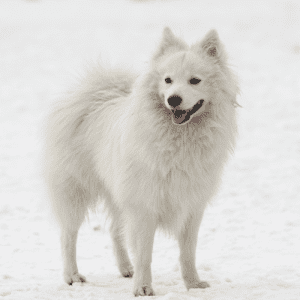
What Is The History Of The Japanese Spitz Dog Breed?
The Japanese Spitz, a charming and elegant breed, finds its origins in Japan. This breed’s history is relatively recent, dating back to the early 20th century when it was developed as a companion and family dog. Bred from white German Spitz dogs, American Eskimo Dogs, and other white spitz-type breeds, the Japanese Spitz was carefully selected for its appealing appearance and affectionate nature. Over time, it gained popularity both within Japan and internationally, captivating hearts with its cheerful demeanor and distinctive snowy white coat. As a beloved companion, the Japanese Spitz continues to brighten households around the world with its playful spirit and endearing qualities.
What Does A Japanese Spitz Look Like?
The Japanese Spitz exudes a charming and captivating appearance. Their small to medium-sized body is covered in a beautiful, pure white double coat that resembles glistening snow. Their triangular ears stand erect, capturing sounds with precision, while their dark, almond-shaped eyes radiate intelligence and warmth. The Japanese Spitz’s plume-like tail curls gracefully over its back, adding to its elegance. With a bright and inquisitive expression, this breed embodies a balance of elegance and playfulness that makes it irresistible to dog enthusiasts.
How Big Is An Adult Japanese Spitz?
Japanese Spitz dogs are small to medium-sized canines, with both males and females typically standing between 10 to 14 inches at the shoulder. Their weight generally ranges from 11 to 20 pounds. This compact size, combined with their endearing appearance and friendly personality, makes them well-suited for apartment living and as companions for families and individuals alike.
Are There Other Dog Breeds Related To The Japanese Spitz?
- American Eskimo Dog: With a shared ancestry, American Eskimo Dogs resemble Japanese Spitz in their white coat and spitz-type traits.
- German Spitz: Contributing to the Japanese Spitz’s development, German Spitz dogs share similar characteristics and a fluffy white coat.
- Samoyed: While larger, Samoyeds exhibit a white double coat and a friendly nature akin to Japanese Spitz.
- Pomeranian: Despite their smaller size, Pomeranians share common traits such as a fluffy coat and lively personality.
- Finnish Spitz: Although distinct, Finnish Spitz also possess some spitz characteristics and are recognized for their red coats and fox-like appearance.
- Volpino Italiano: Resembling the Japanese Spitz, this Italian breed is known for its lively demeanor and distinctive fluffy coat.
- Canadian Eskimo Dog: Similar to the American Eskimo Dog, Canadian Eskimo Dogs share a history of utility and a white coat.
- Schipperke: While not spitz-type, Schipperkes share the Japanese Spitz’s energy and intelligence, making them lively companions.
- Eurasier: Developed from German Spitz and Chow Chows, Eurasiers exhibit a combination of traits similar to those of Japanese Spitz.
- Norwegian Lundehund: Although distinct, these dogs share spitz characteristics and a history of utility, showcasing their unique features.
What Is The Life Expectancy Of A Japanese Spitz?
Japanese Spitz dogs generally have a lifespan of around 12 to 16 years. Providing them with proper care, including a balanced diet, regular exercise, and routine veterinary check-ups, can contribute to their overall well-being and longevity. Their role as beloved companions and their adaptability to various living environments reflect their enduring health and joyful presence.
Can A Japanese Spitz Be Trained?
Yes, Japanese Spitz dogs are intelligent and trainable, and they often excel in obedience training. They have a willingness to please and a quick grasp of commands. Early socialization and positive reinforcement techniques are important to shape their behavior and ensure they become well-mannered companions. Due to their intelligence and playful nature, they can also participate in dog sports and activities that engage their minds and bodies.
What Are Some Interesting Facts About A Japanese Spitz?
- Clean Appearance: Japanese Spitz dogs are known for their self-grooming tendencies, often appearing clean and well-kept.
- Expressive Eyes: Their dark eyes are filled with curiosity and intelligence, reflecting their awareness of their surroundings.
- Friendly Demeanor: Japanese Spitz dogs are social and tend to get along well with children, other pets, and strangers.
- Winter Adaptation: Their fluffy coat might seem ideal for cold weather, but they are also adaptable to various climates due to their moderate size.
- Minimal Shedding: Despite their double coat, Japanese Spitz dogs have a relatively low shedding rate, making them a manageable choice for those concerned about dog hair.
- Alert Watchdogs: Their keen senses and tendency to bark when something is amiss make them effective watchdogs, even though their small size might not initially suggest it.
- Playful Nature: Japanese Spitz dogs enjoy playtime and interactive activities with their human companions, often showcasing their high energy levels.
- Adaptive Diet: Their moderate size and adaptable nature mean that Japanese Spitz dogs can adjust to various dietary conditions.
- Vocal Communication: While not excessively barky, Japanese Spitz dogs do use their voices to communicate their needs and alert their families.
- Loyal Companionship: Their affectionate and loyal nature means that Japanese Spitz dogs often form strong bonds with their human families, bringing joy and companionship to households.
How Does A Japanese Spitz Interact With People?
Japanese Spitz dogs are known for their affectionate and friendly interactions with people. They form strong bonds with their families and often seek out companionship and attention. Their playful demeanor makes them well-suited for families with children, and their willingness to please and learn enhances their role as cherished companions. Around strangers, they might initially be reserved, but their outgoing and sociable nature often leads them to warm up quickly. Overall, their interactions are marked by their intelligence, loyalty, and their innate ability to bring happiness and delight to those around them.
